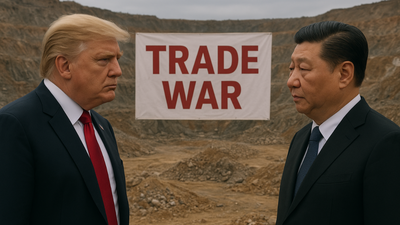ARTICLE AD BOX

(AI image generated using ChatGPT)
US President Donald Trump is turning to allies and private capital to secure America’s supply of critical minerals, including rare earths, as tensions with China escalate. On Monday, Trump and Australian Prime Minister Anthony Albanese signed a landmark $8.5 billion agreement at the White House aimed at boosting rare earth production and protecting the US from Chinese dominance in the sector.“In about a year from now we’ll have so much critical mineral and rare earth that you won’t know what to do with them. They’ll be worth $2,” Trump said, boasting about the agreement. Albanese added that the deal takes the US-Australia relationship “to the next level.”The pact comes after Beijing announced tighter rules requiring foreign companies to seek Chinese approval before exporting magnets containing rare-earth materials produced in or with Chinese technology.
The Trump administration argues this gives China broad control over global tech supply chains.“Australia is really, really going to be helpful in the effort to take the global economy and make it less risky, less exposed to the kind of rare earth extortion that we’re seeing from the Chinese,” Kevin Hassett, director of the White House’s National Economic Council, said ahead of Trump’s meeting with Albanese.
Wall Street to chip in?
Alongside forging international partnerships, the Trump administration is courting private capital to fund a $150 billion US Army infrastructure overhaul.
Army Secretary Daniel Driscoll told the Financial Times that he and Treasury Secretary Scott Bessent met with 15 top private capital firms—including Apollo, Carlyle, Cerberus, KKR, Advent, and BDT & MSD—at a recent deal forum.Driscoll’s pitch highlighted underused Army assets, such as arsenals, depots, data centres, and rare-earth processing sites on federal land. “We are in a hole” that requires creative financing, he said, hoping private credit will help bridge a $135 billion gap in the Army’s budget over the next decade.
“Clever financing models or unique financing models” could unlock value that the public sector alone would struggle to fund, he added.The initiative also reflects a broader Trump-era embrace of private capital. An executive order opened retirement plans to private assets, while tax changes favoured corporate cuts and left carried interest untouched. Attendees seemed broadly supportive, though whether the “meaty projects” materialise remains to be seen.
Why Australia?
Australia’s rich deposits make it a natural partner. The country holds the world’s fourth-largest reserves of rare earths and produces about half of the world’s lithium, vital for electric vehicle batteries. “Australia topped the world as a destination for rare earths exploration, securing $64 million or about 45% of global investment in such projects last year,” said Gracelin Baskaran, director of the Critical Minerals Security Program at the Center for Strategic and International Studies.Under the new deal, the US and Australian governments plan to invest more than $3 billion in joint projects over six months, expected to yield a value of $53 billion. The Pentagon will also fund a 100 metric ton-per-year gallium refinery in Western Australia, while the Export-Import Bank of the United States is issuing letters of interest for over $2.2 billion in financing.Pini Althaus, CEO of Cove Capital, cautioned that contracts with Australian mines must include price floors to protect against Chinese price manipulation.
“I think taking away that arrow in the quiver of China to manipulate pricing is an absolute crucial first step,” he said.
What's the road ahead
The agreement with Australia underscores how the US is leveraging allies to counter China’s dominance. Treasury Secretary Scott Bessent said last week, “They are a state economy and we are not going to let a group of bureaucrats in Beijing try to manage the global supply chains.”However, experts warn that ramping up rare earth production will take time.
John Mavrogenes, an economic geology professor at the Australian National University, said, “I’d say we’re a decade away (from building up the required production capacity), even if we really got serious.”Meanwhile, Trump prepares for a high-stakes Asia trip that will include meetings in Malaysia, Japan, and South Korea, culminating in a potential summit with Chinese President Xi Jinping. Trump expressed confidence, saying, “I think we’re going to end up having a fantastic deal with China” and “it’s going to be fantastic for the entire world.”The US is also exploring domestic expansion of rare earths. Trump invoked wartime emergency powers earlier this year to accelerate production and processing, aiming to reduce dependence on China, which currently supplies 70% of US rare earth imports. “The F-35 fighter jet requires more than 900 pounds (408 kilograms) of rare earths,” the Department of Defense notes, underscoring national security stakes.With Wall Street financing, a $150 billion Army infrastructure push, and strategic alliances with Australia and other resource-rich nations, the Trump administration is aiming to break China’s stranglehold on critical minerals. Yet, analysts caution that while agreements like the one with Australia are crucial, building a sustainable and secure supply chain for the US will remain a long-term challenge.(With inputs from agencies)

 2 hours ago
4
2 hours ago
4









 English (US) ·
English (US) ·